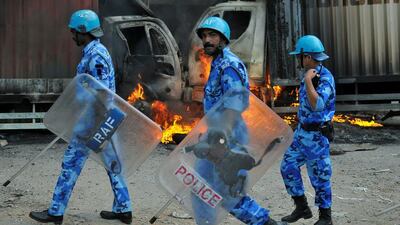BANGALORE // Police arrested nearly 400 people for looting and vandalism in India’s information technology hub of Bangalore after a curfew was imposed to quell violence set off by a court ruling over a disputed water source.
Police gunfire killed one protester and injured another on Monday night after rampaging mobs set fire to dozens of buses, lorries and cars and attacked shops and businesses in Bangalore and other parts of the Karnataka state.
The protests erupted over a Supreme Court order for Karnataka state, of which Bangalore is the capital, to release water from a river to ease a shortage in Tamil Nadu until later this month.
India suffers severe water shortages that cause frequent tensions between states and the row over the Cauvery River stretches back decades.
A curfew was imposed in 15 areas of Bangalore for the next three days “to maintain peace and prevent untoward incidents” during Eid Al Adha, said the city’s police commissioner NS Megharikh.
Bangalore, is the capital of Karnataka and home to major Indian IT companies such as Infosys, Wipro and Mphasis, as well as start-ups such as Ola and Flipkart.
Multinationals like Samsung Electronics, Oracle and Amazon.com also have office there in modern business parks that have sprung up over the past decade or so.
Thousands of English-speaking Indians work in the city’s call centres and back offices.
While the city was calm on Tuesday, protests were staged along the 150-kilometre motorway from the capital to the city of Mysore.
Top police officer N.S. Megarikh said there had been no major incident after the imposition of the curfew in parts of the city on Monday night but protesters set some lorries on fire in rural areas of the state on Tuesday.
Prime minister Narendra Modi on Tuesday appealed for calm in Bangalore, where deadly violence erupted over a long-running dispute with a neighbouring state over access to water.
Around 15,000 police officers were deployed on the largely empty streets of the city to enforce a curfew, after rampaging, mobs set buses and cars ablaze on Monday. Schools and shops were forced to close and both Indian and foreign technology companies including global outsourcing firm Accenture, Infosys and Tata Consultancy Services closed offices and told staff to stay at home.
One protester was killed overnight after police fired on a mob which was trying to torch a police car, said TR Suresh, deputy police commissioner for the north of the city.
Mr Modi called the violence “distressful” and urged restraint in the city, which is a hub for Indian and international technology companies including Microsoft and Dell.
“This dispute can only be solved within the legal ambit. Breaking the law is not a viable alternative,” Mr Modi said in a series of Tweets.
“The violence and arson seen in the last two days is only causing loss to the poor, and to our nation’s property.”
But campaigners in Karnataka were in no mood for lectures from the prime minister. “A grave injustice is being done to us as the state is forced to release more water for growing crops in Tamil Nadu when we don’t have sufficient water for even drinking because of deficit rains,” said Pravish Shetty, who heads a group campaigning for the rights of Karnataka people.
Cable operators in Karnataka have also blocked scores of Tamil Nadu television channels in a bid to defuse tensions, while bus services between the two states have also been suspended.
Karnataka chief minister Siddaramaiah warned on Tuesday of tough punishments for anyone involved in fresh violence.
Vehicles with Tamil Nadu registration plates were attacked on Monday and protesters blocked roads by burning tyres and torching effigies of politicians. Businesses in Bangalore have faced four days of disruption this month because of protests about the water dispute and an unrelated trade union-organised strike on Sept. 2, but this week’s disturbances have been the most serious.
“A group of unidentified miscreants barged into our bus yard and set 30 of our coaches on fire with kerosene or petrol,” Rajesh Natarajan, managing director of KPN Tours & Travels, a company based in Tamil Nadu, told local television.
Earlier this year the government was forced to deploy troops to secure a canal supplying water to New Delhi after it was sabotaged by protesters in neighbouring Haryana state, causing days of shortages in the capital.
To many, Bengaluru’s rise reflects the modern face of a booming India, but the city has also been a victim of poor urban planning and congestion that can produce traffic jams for hours.
*Agence France-Press
* Bloomberg

